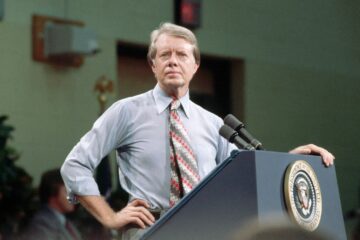Michael Hirsh in Foreign Policy:
 After the Soviet bloc began to disintegrate on his watch, Reagan was—and still is—mythologized as the primary victor of the Cold War.
After the Soviet bloc began to disintegrate on his watch, Reagan was—and still is—mythologized as the primary victor of the Cold War.
Meanwhile, Carter, who died Sunday at 100, is remembered as a somewhat weak leader, preaching naively about human rights, lamenting energy shortages and malaise in his singsong Georgia accent, and practically being hounded from the White House by the 444-day-long Iranian hostage crisis.
So, it may seem strange that Carter, even more so than Reagan, is revered to this day among those who fought on the true front lines of the Cold War: the former dissidents of the Soviet Union and Eastern Europe. “They still see him as the messiah,” Svetlana Savranskaya, a scholar of the Soviet period at George Washington University, told me in an interview. “Their eyes shine when they talk about him.”
Perhaps the least understood dimension of Carter’s much-maligned, one-term presidency was that he dramatically changed the nature of the Cold War, setting the stage for the Soviet Union’s ultimate collapse. Carter did this with a tough but deft combination of soft and hard power. On one hand, he opened the door to Reagan’s delegitimization of the Soviet system by focusing on human rights; on the other hand, Carter aggressively funded new high-tech weapons that made Moscow realize it couldn’t compete with Washington, which in turn set off a panicky series of self-destructive moves under the final Soviet leader, Mikhail Gorbachev.
Enjoying the content on 3QD? Help keep us going by donating now.
